Politics of Malaysia takes place in the framework of a federal representative democratic constitutional monarchy, in which the Yang di-Pertuan Agong is head of state and the Prime Minister of Malaysia is the head of government. Executive power is exercised by the federal government and the 13 state governments. Legislative power is vested in the federal parliament and the 13 state assemblies. The judiciary is independent of the executive and the legislature, though the executive maintains a certain level of influence in the appointment of judges to the courts.
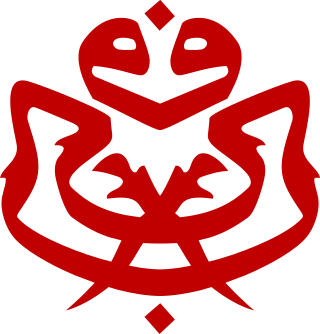
The United Malays National Organisation (UMNO), officially Pertubuhan Kebangsaan Melayu Bersatu (PEKEMBAR), is a nationalist right-wing political party in Malaysia. As the oldest national political party within Malaysia, UMNO has been known as Malaysia's "Grand Old Party".
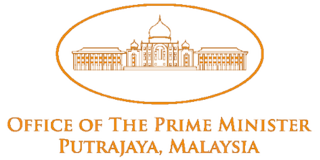
The prime ministerof Malaysia is the head of government of Malaysia. The prime minister directs the executive branch of the federal government. The Yang di-Pertuan Agong appoints the prime minister as a member of Parliament (MP) who, in his opinion, is most likely to command the confidence of a majority of MPs. The prime minister is usually the leader of the party winning the most seats in a general election.
Elections in Malaysia include elections to public office of the political entities that since 1963 have composed the federation of Malaysia. At present, elections in Malaysia exist at two levels: federal level and state level. Federal level elections are those for membership in the Dewan Rakyat, the lower house of Parliament, while state level elections are for membership in the various State Legislative Assemblies. The heads of executive branch at both the federal and state levels, the Prime Minister and Menteri Besar/Chief Ministers respectively, are usually indirectly elected, filled by a member of the majority party/coalition in the respective legislatures.

General elections were held in Singapore on 21 September 1963, five days after Singapore became part of Malaysia. Voters elected all 51 members of the Legislative Assembly. The elections were the only ones to date with no boundary changes to any existing constituencies prior to the elections. The result was a victory for the People's Action Party (PAP), which won 37 of the 51 seats, while the majority of the remaining seats were won by Barisan Sosialis (BS).

The Singapore Alliance Party, or simply the Singapore Alliance, was a political coalition formed on 2 June 1961 that contested several elections in Singapore, notably the 1955 Elections of Singapore and the 1963 Elections of Singapore. It consisted of the local branch of the United Malays National Organisation (UMNO), the Malay Union, the local chapters of the Malayan Chinese Association and the Malayan Indian Congress, and former Chief Minister Lim Yew Hock's Singapore People's Alliance (SPA).

Ketuanan Melayu is a political concept that emphasises Malay power and preeminence in present-day Malaysia. The Malaysian Malays have claimed a special position and special rights owing to their longer history in the area and the fact that the present Malaysian state itself evolved from a Malay polity. The oldest political institution in Malaysia is the system of Malay rulers of the nine Malay states. The British colonial authorities transformed the system and turned it first into a system of indirect rule, then in 1948, using this culturally based institution, they incorporated the Malay monarchy into the blueprints for the independent Federation of Malaya.

Malaysia is a country in Southeast Asia. A federal constitutional monarchy, it consists of 13 states and three federal territories, separated by the South China Sea into two regions: Peninsular Malaysia and Borneo's East Malaysia. Peninsular Malaysia shares a land and maritime border with Thailand and maritime borders with Singapore, Vietnam, and Indonesia. East Malaysia shares land borders with Brunei and Indonesia, as well as a maritime border with the Philippines and Vietnam. Kuala Lumpur is the national capital, the country's largest city, and the seat of the legislative branch of the federal government.
The Cabinet of Malaysia is the executive branch of the Government of Malaysia. Led by the Prime Minister, the cabinet is a council of ministers who are accountable collectively to the Parliament. According to the Article 43 of the Federal Constitution, members of the Cabinet can only be selected from members of either houses of Parliament. Formally, the Yang di-Pertuan Agong appoints all Ministers on the advice of the Prime Minister. The constitution is amended by repealing the Clause (8) of Article 43, enabling a person who is a member of State Legislative Assembly to continue to serve even while serving as a minister or deputy minister in the cabinet. Ministers other than the Prime Minister shall hold office during the pleasure of the Yang di-Pertuan Agong, unless the appointment of any Minister shall have been revoked by the Yang di-Pertuan Agong on the advice of the Prime Minister but any Minister may resign from office. In practice, the Yang di-Pertuan Agong is obliged to follow the advice of the Prime Minister on the appointment and dismissal of ministers.

The self-governance of Singapore was carried out in several stages. Since the founding of Singapore in 1819, Singapore had been under the colonial rule of the British. The first local elections on a limited scale for several positions in the government of Singapore started in 1948 following an amendment to the Constitution of Singapore.

General elections were held in Malaysia on Saturday, 8 March 2008. Voting took place in all 222 parliamentary constituencies of Malaysia, each electing one Member of Parliament to the Dewan Rakyat, the dominant house of Parliament. State elections also took place in 505 state constituencies in 12 of the 13 states on the same day.

Local government in Malaysia is the third tier of government, administered under states and federal territories which in turn are beneath the federal tier. Local governments are generally under the exclusive purview of the state governments as provided in the Constitution of Malaysia, except for local governments in the federal territories. The federal Ministry of Housing and Local Government plays a role in coordinating the regulations of local governments across the country.

General elections were held in Malaysia on Sunday, 5 May 2013. Voting took place in all 222 parliamentary constituencies, each electing one MP to the Dewan Rakyat, the dominant house of Parliament. State elections also took place in 505 state constituencies in 12 of the 13 states on the same day. The elections were the first since Najib Razak became Prime Minister in 2009.
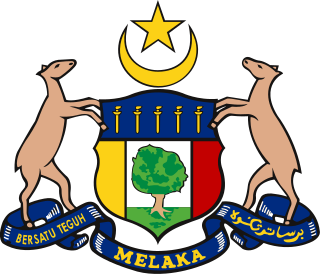
The Malacca State Legislative Assembly is the unicameral legislature of the Malaysian state of Malacca. It is composed of 28 members who are elected from single-member constituencies throughout the state. Elections are held no more than five years apart, along with elections to the federal parliament and other state assemblies.

The Johor State Legislative Assembly is the unicameral legislature of the Malaysian state of Johor. It is composed of 56 members who are elected from single-member constituencies throughout the state. Elections are held no more than five years apart, along with elections to the federal parliament and other state assemblies.
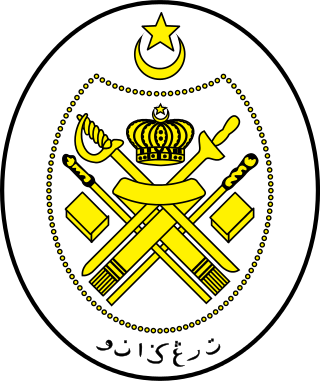
The Terengganu State Legislative Assembly is the unicameral state legislature of the Malaysian state of Terengganu. It consists of 32 members representing single-member constituencies throughout the state. Elections are held no more than five years apart, and are customarily held alongside elections to the federal parliament during a general election.
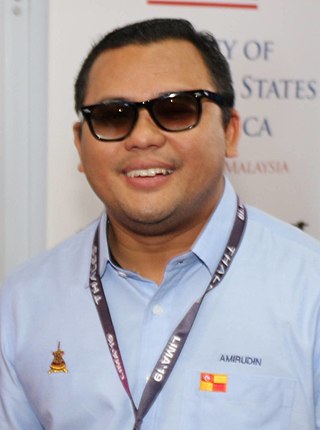
Dato' Seri Amirudin bin Shari is a Malaysian politician who has served as the 16th Menteri Besar of Selangor since June 2018, Member of the Selangor State Legislative Assembly (MLA) for Sungai Tua since May 2018 and Member of Parliament (MP) for Gombak since November 2022. He served as Member of the Selangor State Executive Council (EXCO) in the Pakatan Rakyat (PR) and Pakatan Harapan (PH) state administrations under former Menteri Besar Mohamed Azmin Ali from September 2014 to his promotion to the Menteri Besarship in June 2018 as well as the MLA for Batu Caves from March 2008 to May 2018. He is a member of the People's Justice Party (PKR), a component party of the PH and formerly PR coalitions. He has also served as the Vice-President of PKR since July 2022 and State Chairman of PH of Selangor since March 2020 as well as of Pahang from September 2022 to August 2024.
Elections in Sarawak have been held in the Malaysian state of Sarawak since 1959 and have chosen Sarawak's elected representatives in the Dewan Rakyat and Dewan Undangan Negeri.

Mahir Ünal is a Turkish politician and academic from the Justice and Development Party (AKP) who served as the Minister of Culture and Tourism from 24 November 2015 to 24 May 2016. He has been a Member of Parliament for the electoral district of Kahramanmaraş since being elected in the 2011 general election. He was re-elected in both the June and November 2015 general elections.
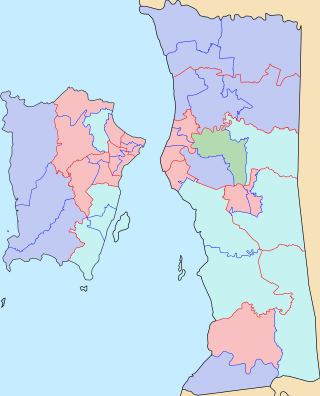
The 12th Penang election was held on 8 March 2008. Polling took place in 40 constituencies throughout the State of Penang, with each electing a State Assemblyman to the Penang State Legislative Assembly. The election was conducted by the Malaysian Election Commission.















